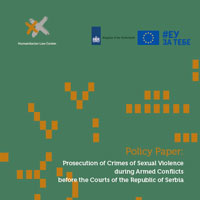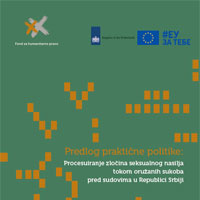Policy Paper: Prosecution of Crimes of Sexual Violence during Armed Conflicts before the Courts of the Republic of Serbia
 In 1991 and 1992, while conflict took place in Bosnia and Herzegovina (BiH), the international community was interested in allegations by the media and non-governmental organisations that sexual violence was frequently committed. As a result, certain domestic and international organisations, began investigating those media allegations, and the UN Security Council formed the Panel of Experts, with the aim of determining whether sexual violence was strategically used as a weapon of war. The report submitted by the Panel of Experts influenced the establishment of the ICTY in 1993 and the creation of a new legal framework dealing with sexual violence.
In 1991 and 1992, while conflict took place in Bosnia and Herzegovina (BiH), the international community was interested in allegations by the media and non-governmental organisations that sexual violence was frequently committed. As a result, certain domestic and international organisations, began investigating those media allegations, and the UN Security Council formed the Panel of Experts, with the aim of determining whether sexual violence was strategically used as a weapon of war. The report submitted by the Panel of Experts influenced the establishment of the ICTY in 1993 and the creation of a new legal framework dealing with sexual violence.
Although the extent of sexual violence committed in the former Yugoslavia is undoubtedly huge, the Office of the War Crimes Prosecutors has so far prosecuted only 10 cases of sexual violence committed during the conflict, out of which one case was about sexual violence for which criminal charges were pressed as late as 2018, whereas the other nine cases were about sexual violence and murder.
This policy paper is intended for Serbian institutions responsible for investigating and processing wartime sexual violence. Namely, the HLC has been monitoring all trials before the War Crimes Department of the Higher Court in Belgrade since 2003. During its sixteen years of existence, the HLC has identified certain defects that must be removed to ensure successful prosecution of crimes before the domestic court. In view of this, this policy paper is divided into two parts. The first part contains an analysis of the international framework for the prosecution of these crimes, whereas the second is focused on the domestic legislative framework related to them and contains recommendations for its improvement.
The Policy Paper is available here.







